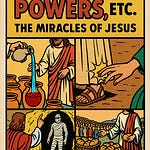John 11.1-44
When I was a boy, during the years when my father’s disease was at its nadir and he was seldom at home and my mother worked the night shift, I had a respite of sorts at my grandparents’ home. My grandmother Theresa was an Italian immigrant and, like so many, a cook. So far as I know, my grandmother did not attend Mass. But she did have a portrait of Pope John Paul on the wall near the kitchen. And the bed into which she tucked me had mounted above it a frighteningly large, baroque crucifix.
And she prayed.
Theresa may not have been a churchgoer, but she was a praying woman.
Every night that she put me to bed, she would smooth my hair and pray the Our Father over me and then, as a sort of benediction, she would say, “We’re here. We’re here for you.” To paraphrase Cormac McCarthy, if my grandmother’s words were not, for me, the word of God, then God never spoke.
When I was in junior high school, Theresa succumbed to an illness that led to death. But it did not end in death; it ended in God. I know not only because the Bible tells me so but because twenty years ago, at my ordination service, I knelt before the bishop who stood beside the loaf and the cup on the altar as the body of believers gathered around us. And as the bishop laid hands on me to consecrate me to this bewildering, ill-fitting vocation, I suddenly had this apprehension— this audition— of my grandmother Theresa. And I heard her as clearly as I heard you all profess the creed. She did not appear as I had known her: horn-rimmed glasses, forearms made stout by kneading pasta dough, the trace of a black mustache.
I did not recognize her, but I suddenly knew it was her.
She was not as I had known her, but what she said to me was what she had always said to me, “We’re here. We’re here for you.”
Now I do not believe that was a delusion. I believe it is what the Book of Hebrews calls “the great and encompassing cloud of witnesses” and what the rule of faith calls the communion of saints. I believe I truly heard and encountered her. I believe the gospel requires me to believe it. Nevertheless, I would prefer— if I had things my way— that she never would have died in the first place. Instead of that momentary encounter with her, I would rather have her— all of her— restored to me.
What about you?
What would you give to get someone you loved dearly back from death?
Or how would you celebrate if you did get them back?
Six days before he is high and lifted up, enthroned upon his cross, Jesus is back in their house in Bethany. Christ’s visits to the family were the only times of peace in his adult life and before he dies— he knows he’s going to die— this is where he wants to make his home. Expecting his return, Mary spent roughly the equivalent of forty-five thousand dollars on nard to anoint the feet of the friend who called her brother forth from his tomb.
“Lazarus, come out,” Jesus summons his dead friend.
His friend who has been dead for four days.
The formerly dead friend stumbles out of the tomb in his grave clothes, his eyes wrapped shut and his feet shackled in burial linen.
“Unbind him, and let him go,” Jesus issues the command knowing it will set in motion the plot to murder him.
Christ’s raising of Lazarus from the dead, his sister’s grateful response, and the plot the miracle provokes— against both Jesus and Lazarus— the story spans sixty-seven verses, across chapters eleven and twelve of the Gospel of John. It is the longest dramatic unit in the New Testament. And the story itself sits at the center of John’s Gospel. According to the New Testament scholar, Frederick Dale Bruner, the brother of Martha and Mary is “the fourth gospel in miniature.” This makes it all the more surprising that the scriptures provide Lazarus absolutely no characterization.
We do not know his age or his trade. We do not know if he looked after his sisters or they looked after him. We do not know if he was faithful or righteous, a disciple or a patron. We know Martha busied herself with hospitality and was not afraid to give Jesus a piece of her mind. We know Mary sat at Jesus’ feet and attended to his teaching; we also know Mary was wealthy. But we do not know if Lazarus took after either of his sisters.
Lazarus is just a name in the story.
The scriptures provide him no biographical detail or adjectival attributes.
We know the surrounding community from Bethany to Jerusalem knew Lazarus— there’s a crowd still gathered at his grave four days later— but we do not know what they knew about him.
Like us, Lazarus lived only a few miles from the nation’s capital. Did Lazarus have political convictions? Was Lazarus an ally of the administration as was Matthew the Tax Collector, or was Lazarus, like Simon, part of the resistance? Jesus inconveniently kept both parties in his company. We do not know where on the partisan divide Lazarus stood. The Bible does not bother to mention his politics much less anything else about him.
His name means “God has helped” but we do not know who God helped.
We do not know anything at all about Lazarus.
Except.
We know two facts about Lazarus:
Martha and Mary loved him.
And so did Jesus.
Lazarus was their brother.
Lazarus was his friend.
The scriptures know Lazarus only as the friend whom Jesus loves. “See how he loved him!” the crowd at the not empty tomb whispers as Jesus weeps. “Lord, he whom you love is ill,” the sisters sent word to Jesus without needing to supply any other identifying information.
All we know of Lazarus is that Lazarus is Jesus’ friend.
In his 1997 book on filmmaking entitled the Act of Seeing, the German director Wim Wenders— he made the films Paris, Texas and Wings of Desire— explains the stakes of his craft by insisting, “The most political decision you make is where you direct people’s eyes.” I believe this is no less true of the preacher’s craft. The most political decision I can make is where I direct your eyes. In our present moment, politics itself demands your monogamous affection; just so, to fix your eyes on this scene in the Gospel of John is itself a counter-politics, a protest.
We do in fact have a king!
We do have a king.
But he calls us neither his subjects nor his slaves but his friends.
His beloved friends.
What the scriptures do not tell us about Lazarus, they do not tell us on purpose. Their reticence is the revelation. The paucity of details about Lazarus is actually the abundance of Christ’s love. The scriptures do not tell us anything about Lazarus in order to to proclaim everything you need to know about Jesus.
Lazarus is not anonymous.
Lazarus is all of us.
You are Lazarus.
The scriptures do not tell us anything about him; so that, you can see that Christ’s love for you depends not at all on you. His love for you depends entirely on his choice— his eternal decision— to call you friend. In a world with so much bad news, the term “good news” does not even begin to capture the miraculous mystery.
The Maker of Heaven and Earth wants you as his friend.
And you would rather talk about politics?
There is nothing more urgently important in the world than for me to direct your eyes to Lazarus.
At the end of the summer Graham Weihmiller, who grew up in the church, messaged me. Shortly before his father died, I went to Gordon’s bedside to hear his confession and hand over the absolution. Presumably wanting to know more about the man he loved and missed, Graham texted me because he was curious about the fears and burdens his father carried unto death.
Gordon was a Vietnam veteran. The cancer that was killing him came from Agent Orange, which killed others— including innocents. When I entered the bare white room of his home, I knew Death was only a few days away. As soon as I sat down beside his bed, Gordon said— his words came out slow and pained, like he was in labor, like he was delivering them. I could tell he was afraid that his illness would end in death.
“I want to give Christ what remains of my life,” he said, pushing the piety— out of character for him— from his mouth.
I nodded.
“And I want to confess,” he said, staring at the ceiling, “what I had to do in the war…it was necessary…but it was still sin.”
He said the s-word as though it was unfamiliar on his lips.
I nodded again, attempting to demonstrate that his anxiety did not make me anxious. When he finished confessing, I stood up. I reminded him of his baptism. I traced the sign of the cross on his forehead. And I gave him the absolution.
I knelt at his bed so I could look him in the eye.
And I whispered it like a secret.
“Gordon,” I said, “In the name of Jesus Christ and by his authority alone, I announce to you the entire forgiveness of your sins.”
He smiled a little and I saw the tension relax a little under the sheets.
I was about to get up and go when he coughed and hoarsely asked, “Do you think that will do it? Confessing and asking him into my heart and all?”
He asked the question as though we’d just been given the check for dinner and he wondered if we had the cash between us to cover the tip too.
“Do I think that will do it?” I repeated his question.
He nodded, “Yeah, get me in the right. With Jesus.”
“Gordon,” I said, “We just met. I don’t know anything about you— other than what you’ve just told me. I only know you’ve got a family who loves you. And I know Jesus already called you his friend long before today.”
Those were some of the last words I spoke to him.
I don’t know if he believed it.
But I do know it’s true.
As the theologian Stanley Hauerwas says, the way the words run matters.
Twice before the grave of his friend Jesus “groaned deeply within himself.” This is not mere weeping. This is a confrontation with the Powers of Sin and Death. More than mourning, the raising of Lazarus is the battle before the Last Battle. Jesus is not simply weeping. He is engaging the Enemy. Lazarus is the fourth gospel in miniature because Christ before his tomb is a preview of the Passion.
Now notice— I’m directing your eyes to the passage.
The way the words run matters.
Christ’s confrontation with the Powers who hold Lazarus in their grip comes thirty-five verses after John has already told us that Jesus loved Lazarus. The sinner Christ is about to redeem from Death is already a friend of Jesus. According to a Reformation principle, scripture interprets scripture— sola scriptura. That is, the scriptures are like a vascular system. Every passage is interconnected and mutually determined. Therefore, the place to begin understanding the story of Lazarus is not the Gospel of John but Paul’s Letter to the Ephesians.
Paul says explicitly what John only shows.
The apostle follows the salutation of his epistle with a doxology:
“Blessed be the God and Father of our Lord Jesus Christ, who has blessed us in Christ with every spiritual blessing in the heavenly places, even as he chose us in him before the foundation of the world, that we should be holy and blameless before him. In love he predestined us for adoption to himself as sons through Jesus Christ, according to the purpose of his will, to the praise of his glorious grace, with which he has blessed us in the Beloved. In him we have redemption through his blood, the forgiveness of our trespasses, according to the riches of his grace, which he lavished upon us, in all wisdom and insight making known to us the mystery of his will, according to his purpose, which he set forth in Christ as a plan for the fullness of time, to unite all things in Christ, things in heaven and things on earth in him.”
Again, the way the words run matters.
In this gospel praise, Paul does not make any mention of redemption and blood, sins or forgiveness or grace— not one word— until he is seven verses into his ten verse doxology. Paul writes six long verses about you being chosen in Christ Jesus before he utters a single word about the cross. From before the foundation of the world, Paul says, the LORD Jesus chose you as his friend.
It is true that while we were yet sinners, Christ died for us. It is true that at the right time, Christ was crucified for the ungodly. It is true that the Father’s only begotten Son came after us when we were lost and forsaken in the Far Country. But Jesus does not love you in spite of yourself; he loves you because he knows who you are— because before there was anything (before God uttered a single “Let there be…”), there was in the eternal heart of the Triune God the thought of you.
The unique person you call me.
Was predestined.
The way the words run matters.
From before the foundation of the world…
Before atoms and quarks and nucleic acids, he chose you.
And he purposed everything in creation for you.
Not because you are a sinner he would eventually die to save. But because he wants you as his friend. We call him king, but he wants you as his friend and as his equal, his bride and his body— eternally. Just like this gospel in miniature, the cross does not create his friendship with you. The cross happens in the context of his friendship with you. Christ does not make you his friend by dying for you when you did not deserve it; already you were his friend and that is why he dies for you though you do not deserve it.
The gospel is not about our estrangement from God.
The gospel is about God’s eternal desire to be friends with us.
The cross is what God endures to that End.
Long before Jesus redeems his friend from the grave, we have already learned, “The one whom you love is ill.” The cross occurs within the context of his friendship with you; it does not create the possibility of friendship with you. This larger frame of love and friendship helps us read this passage rightly. The way the words run matters.
For example:
When Jesus arrives in Bethany, Lazarus has been dead for how long?
Four days.
When Jesus learns from Bethany Lazarus is ill, he delays how many days?
Two days.
Do the math: Jesus knows Lazarus has already died. Jesus delays because he loves Martha and Mary. It says it right there in the Gospel. Jesus waits because he loves Lazarus’ sisters. In other words, because they are his friends, he first gives them time to sit with the death. He gives them space to grieve.
Jesus already knows Lazarus has died.
This is why when word reaches them from Bethany, Jesus responds to the letter by saying, “This illness is not unto death.” This is a callously cavalier prediction if Lazarus’ life hangs in the balance. But it is an odd claim if Jesus already knows his friend has died, for then Jesus can only mean that this illness will not end in death. Indeed no affliction will end with death because from before the foundation of the world, he who is Resurrection and Life called you friend.
He comes not simply to take away your sins.
He comes to make you everything he is.
He wants only our good.
He means to make us equals.
Brothers and sisters of the Father’s risen Son.
Which explains what is missing from this long story in the Gospel of John.
As I stood up from Gordon’s bedside and was about to leave him, he rolled over onto his back and gazed down at his body like it was an hourglass leaking sand.
“If what you said about Jesus is true,” he whispered, “then please tell me I can look forward to a better body than this body.”
I laughed, but he turned his head and furrowed his eyes.
“I’m serious,” he said, “There was a time when I was handsome.”
He gestured at himself, gaunt and yellowed.
“Is this what I’m going to look like in the Resurrection?”
Here is a version of the earlier question:
If someone you loved and lost was resurrected would you recognize them?
The way the words run matters.
When Christ commands the crowd to unbind Lazarus from his funeral shroud and they obey, what is key to the passage is what does not follow next. No one in the crowd in Bethany reacts to the raised man by asking, “Who is this?” Not a single person even responds with fear. They all recognize him as the brother of Martha and Mary. He is again who he had been. Like the widow of Nain’s boy, like the Shunammite woman’s son, the miracle is merely the resumption of his life. Jesus starts Lazarus’ life up again. Resuscitation is the next thing that happens to Lazarus after death.
And so Lazarus appears as he did just four days prior.
And everyone easily recognizes him.
This is not true of Jesus (nor was it true of my grandmother, Theresa).
No one recognizes the Risen Jesus. Mary Magdalene mistakes him for the gardener. Behind locked doors, on the Sea of Galilee, atop the mountain, on the road to Emmaus— neither Saul nor Thomas— in all of the Easter stories, no one immediately recognizes the Risen Jesus as the Jesus they had known.
Why?
The Resurrection is not resuscitation. Easter is not the next thing that happened to Jesus. It is not his life simply starting up again. When Lazarus steps out of the tomb, he is yet one day closer to death. But God resurrects Jesus’ entire life. And he will yours.
As the theologian Karl Rahner puts the mystery in an Easter homily, “Jesus’ Resurrection is not the return of a deceased man to our time and space (which is precisely how most Christians understand Easter)…the Risen Jesus announces the fact that he has been saved forever and his entire life has been accepted by God.”
In other words, Resurrection is not just something that happens to Jesus after his life. It happens to the whole of his life. The baby in the creche, the boy Mary and Joseph lost in the Temple, the Beloved Son in his water of baptism, the friend reclined in the home of Lazarus and his sisters Resurrection includes all of those identities of Jesus.
“Is this what I’m going to look like in the Resurrection?” Gordon asked me.
I sat back down in the chair beside his bed. I looked over the body that was betraying him, and I asked him:
“If God resurrected the boy you were on Long Island and the student you were at Brown University, if God resurrected the officer you were in Vietnam along with the teacher you were at Princeton, if God raised the you you were as a husband and as a father and also the dying you, if the resurrected you includes all those selves, what do you think you would look like?”
“I don’t have a clue,” he said with a little hoarse sarcasm, like he was rethinking the deathbed conversion from a moment ago, “My wife and parents and sons might not even recognize such a self.”
“Exactly,” I said, “Otherwise, eternity is not truly fullness and thus not truly good.”
Jesus resuscitates Lazarus.
It is a miracle.
It is not the mystery.
When Lazarus’ life starts up again, he is one moment closer to death.
Lazarus will die again.
But when the LORD resurrects Lazarus, he will not be so easily recognized.
Remember, Resurrection happens not just to bodies but to all things, including the creature called time— that is 1 Corinthians 15.28. Therefore, whatever we mean by Resurrection, we must mean something that happens to an entire life—something that gathers it all up and makes it whole again.
Think about your life—how you are not who you once were. You’ve passed through many small deaths and births: the child you were, the friend you used to be, the one who dreamed certain dreams or loved certain people. Each stage brings joy and loss, beauty and grief. As Augustine writes in his Confessions, “time cuts us up.” It divides us from our former selves; part of us is always out of reach. If resurrection means anything, it must be the healing of that divided life—the gathering up of all you’ve been and will be into one whole.
Jesus is the first fruit of that New Creation. The resurrected Jesus is not a man with memories of who he once was but the fullness of his entire story—crèche to cross—made whole. To be known, and to know yourself, not in fragments but as your whole story at once—every good thing made present, nothing lost, and still you—that is resurrection. It is not something that happens after life; it happens to the whole of life. And so it will be for Lazarus, and for you.
I stood up from the chair once again.
Gordon asked me to help him sit up. He hooked his arms around my neck and I pulled him up against the pillows along the headboard of the bed.
“But why would,” Gordon corrected himself and reframed it in terms of faith, “Why does God resurrect all of it— all of me?”
“It’s like I told you before,” I said, “You might have been different people over the course of your life— maybe the world gave you no choice. But there has never been a time in your life— there is no version of yourself— when Jesus didn’t call you a beloved friend. Resurrection means Jesus gets all of his friends.”
The most political decision I can make is where to direct your eyes. But when it comes to Resurrection, the promise is so kaleidoscopically inconceivable it defies a concrete image even as it demands nothing less than this claim.
No affliction you suffer will end in Death. Our End is the Triune LORD. But Resurrection is not simply something that will happen to you after your life. Resurrection will not be your life starting up again. Resurrection will happen to the whole of your life. And all the multitude of selves contained therein.
How can I possibly direct your eyes to such a mystery?
The way the words run matters.
To the table.
To loaf and cup.
The bread and wine are tangible, visible reminders that whatever is going on in your life, no matter what you are going through, despite how things might appear, your crucible is always happening within the context of his friendship with you— it is never a condition for it.
So, like he commanded at Bethany: “______ come out! Come to the table.”
Somehow the bread and the wine are our Friend from before the foundation of the world. And he always brings other friends with him— the whole company of heaven, the communion of saints— saying, “We’re here for you. We’re here for you.” And if you can taste and see such a mystery in the present, then perhaps you can believe that the Future— the future you— is better news than you ever dared to imagine.












